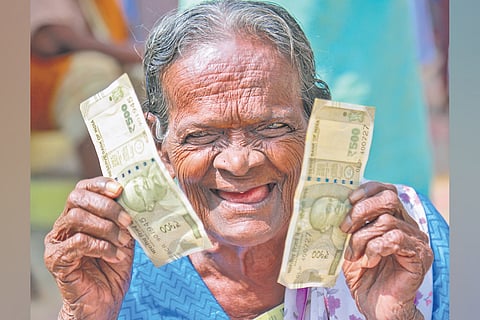

CHENNAI: Ever since coming to power in 2021 after a decade-long gap, the DMK government has introduced one major welfare scheme after another, mainly targeting women and students to help them towards social and economic stability. Some of them have been emulated by other States as well.
The first big move came within the very first month of assuming office with the introduction of free bus travel for women followed by the Chief Minister’s Breakfast Scheme for elementary kids and Pudhumai Penn Scheme for girls' higher education in 2022.
After being questioned by the opposition for two years on its DMK’s electoral promise of providing Rs 1,000 per month to women, the government rolled out the Kalaignar Magalir Urimai Thogai (KMUT) scheme in 2023. Although the opposition parties criticised it for not being universal as promised ahead of the polls, the scheme has benefitted 1.15 crore women from economically weaker sections.
In 2024, the government introduced a scheme similar to Pudhumai Penn for boys, named Tamil Pudhalvan, offering Rs 1,000 a month to support male students to pursue higher education.
Around 59 lakh women utilise the free bus travel on a daily basis. The CM's Breakfast Scheme reaches 17.53 lakh students, while the Pudhumai Penn Scheme aids 4.9 lakh girls, and the Tamil Pudhalvan Scheme has around 4.25 lakh beneficiaries. On the health front, the Makkalai Thedi Maruthuvam Scheme, a scheme to tackle increasing non-communicable diseases among the state's population introduced in 2021, has covered over 2.2 crore people across the state by providing doorstep healthcare services and has also been appreciated by the World Health Organisation.
In total, these flagship welfare schemes have had an impacted on at least around 25% of the state's population.
More recently, the DMK government announced the revival of the free laptop scheme, this time targeting 20 lakh college students at an estimated cost of Rs 2,000 crore. While the scheme is a modified version of the one introduced by the previous AIADMK government, which provided laptops to students in Classes 11 and 12, the shift in focus to college students appears to be a strategic move, possibly aimed at wooing first-time voters.
A glance at the DMK’s election manifesto will show that the party wove in all the demands of a wide cross-section of voters from government employees and farmers to daily wage workers and the general public, promising to fulfill their long-standing expectations. With only a year left for the elections, some of the key promises that are yet to be fulfilled include restoring the Old Pension Scheme, reducing LPG, petrol and diesel prices, providing 100 units of free electricity every month (as opposed to the current bimonthly model) and increasing the number of workdays under MNREGA to 150. The State government has cited financial situation, primarily due to non-release of funds from the Union government as the primary reason for its failure to fulfil these promises.
The DMK has also been criticised for its failure to obtain exemption for NEET although the party has said that it would have achieved had there been a regime change in the centre in 2024.
Despite such unfulfilled promises, studies have shown that welfare schemes involving direct cash transfers tend to have a greater electoral impact than promises related to infrastructure or long-term policy reform. Research also suggests that such schemes resonate more strongly in rural areas than in urban centres, where voter priorities are more varied. For instance, a post-poll survey by Ashoka University showed that 68% of beneficiaries of welfare schemes said they voted for the party that introduced the schemes.
While the DMK holds the distinction of being the first regional party in India to form a government by defeating the Congress in 1967, it has not secured two consecutive full terms in power since MG Ramachandran split from the party and formed the AIADMK in 1972. The party now appears to be banking heavily on its large-scale welfare schemes to break this long-standing jinx and retain power in the 2026 assembly elections.